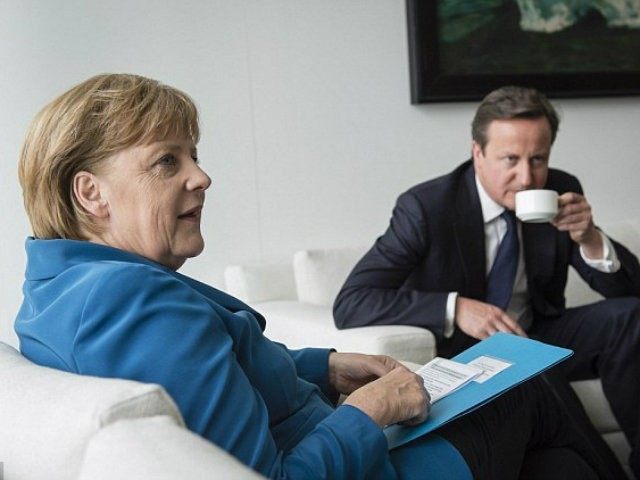David Cameron’s plans to cap the number of migrants from the EU coming to Britain were dropped from a key speech after protests by Angela Merkel, Government sources say.
The German Chancellor, who is meeting with the Prime Minister in London today ostensibly to discuss the global and European economic situation, was strongly opposed to Cameron’s idea of an ‘emergency brake’ on numbers, the Daily Mail reports.
The proposals were to form a key element of a much awaited speech on controlling the numbers coming to Britain from within the European Union after a year that saw the Prime Minister lose a national election and two MPs to UKIP.
But, afraid of upsetting the powerful German Chancellor, senior sources say the policy suggestions were dropped only 48 hours before the speech was delivered, in a policy of appeasement to Mrs Merkel and her government.
Unlike the UK economy which has seen the minimum wage in many industries become the maximum wage, and increasing anger by the public at the EU migrants they see as taking advantage of a generous welfare state in Britain, Germany is reliant on immigration for economic growth.
The Prime Minister proposed curbs on tax credits, child benefit, jobseeker’s allowance, housing benefit and council housing for incomers. Some of these would be be possible to do without any fundamental Treaty change if the rules for Britons were changed to require a certain level of contribution or time in the country but specifically excluding people from benefits on the grounds of their country of origin is forbidden under EU law.
But despite leaving the suggestions out of the key speech he is expected to tell Mrs Merkel today that the threat of a Brexit is real unless there are real concessions made to Britain.
These include an end to paying child benefit for offspring not living in the UK, which in December was revealed to be 34,000 children predominantly living in Poland and other Eastern European countries. Out-of-work benefits would also be stopped altogether while tax credits, used to top up low salaries which have become the norm in retail and other service sector jobs would need to be limited to those who had been in the UK for four years or more.
Mr Cameron is seeking to ensure he will gain approval for any proposals from Mrs Merkel before he puts concrete proposals in front of the Council of Ministers, who would have to approve them unanimously: something which one Polish Minister has already said his country will not be supporting. Finance Minister Mateusz Szczurek told MEPs on Tuesday that “questioning freedom of movement means the end of the eurozone for sure and probably end of the EU, because it goes at the heart of the single market.”
The corner stone of the discussions and any progression in negotiations, however, come down to one key element. Mrs Merkel is not prepared to negotiate on freedom of movement and is willing for Britain to leave the EU if he insists this changes.
The news of such an important policy measure being left out of the Prime Minister’s much promoted speech for fear of upsetting the Germans will anger many Conservative backbenchers and grass roots members.
Eurosceptic MP Sir Bill Cash believes Britain would need a cap on numbers to reduce the level of immigration.
“Our economy is doing pretty well, and actually that means more people are going to come in. Therefore the cap is really the key question, and if you don’ t have a cap then it won’t work… unfortunately that seems to have been abandoned,” he said.
Both Mrs Merkel and Mr Cameron have tried to turn the attention of their meeting away from discussions on immigration to the economy. Unusually, ahead of their meeting they released a joint statement which made it clear they wanted any discussions about their meeting to focus on the economy.
‘We must do more to make the EU more stable and competitive than it is today. We have both taken steps at home to consolidate our public finances and it is important that we continue to pursue this long-term plan.
‘We must do more to harness the potential of the single market and reduce regulation that is hampering business. We must also dismantle further barriers to trade, in particular by agreeing an EU-US trade deal in 2015.’
UKIP Leader Nigel Farage was unimpressed by rumours ahead of the meeting, simply saying “We are going to get no major concession on our EU membership.”
“On the big red line issue which is control of our borders, its been made clear that Cameron cannot get the consent of 27 EU member states for treaty change. Anything else is merely cosmetic.”
The German Chancellor will not be meeting Ed Miliband while she is in London, something the Labour party have blamed the Government for, saying that they did not tell his office that Mrs Merkel was coming to London.

COMMENTS
Please let us know if you're having issues with commenting.